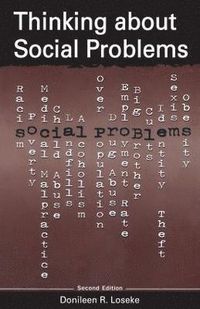
spara 48%
5+ säljare
Thinking About Social Problems Upplaga 2
Like the first edition of this distinctive and widely adopted textbook, the new second edition brings into the classroom an overview of how images of social problems can shape not only public policy and social services, but also the ways in which we make sense of ourselves and others. It introduces two primary changes from the first edition. First, this edition devotes some attention to the "new social movements" that emphasize social change through identity transformation rather than through structural change. Second, it also looks more closely at the importance of emotions in constructing public consciousness of social problems. Although Thinking About Social Problems can be used as a stand-alone short text and a corrective on received notions of studying the objective indicators of one problem a week, Donileen Loseke and Joel Best have provided an accompanying reader, Social Problems: Constructionist Readings, which can be used by those who wish to teach the course with reference to empirical examples of social problems examined from constructionist perspectives. Finally, an instructor's manual on a CD-ROM will be available for instructors who adopt the new edition. (Bookdata)
Upplaga: 2a upplagan
Utgiven: 2003
ISBN: 9780202306841
Förlag: AldineTransaction
Format: Häftad
Språk: Engelska
Sidor: 250 st
Like the first edition of this distinctive and widely adopted textbook, the new second edition brings into the classroom an overview of how images of social problems can shape not only public policy and social services, but also the ways in which we make sense of ourselves and others. It introduces two primary changes from the first edition. First, this edition devotes some attention to the "new social movements" that emphasize social change through identity transformation rather than through structural change. Second, it also looks more closely at the importance of emotions in constructing public consciousness of social problems. Although Thinking About Social Problems can be used as a stand-alone short text and a corrective on received notions of studying the objective indicators of one problem a week, Donileen Loseke and Joel Best have provided an accompanying reader, Social Problems: Constructionist Readings, which can be used by those who wish to teach the course with reference to empirical examples of social problems examined from constructionist perspectives. Finally, an instructor's manual on a CD-ROM will be available for instructors who adopt the new edition. (Bookdata)
Begagnad bok
345 kr659 krSpara 314 kr (48%) mot nypris
Fri frakt & skickas inom 1-3 vardagar
Köpskydd med Studentapan
Varje köp täcks av Studentapans köpskydd som säkerställer att boken kommer fram, att du får rätt bok och att skicket stämmer överens med beskrivning.



